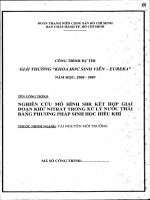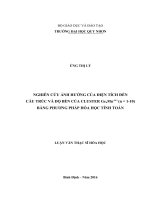Slide Hóa học: NGHIÊN CỨU VỀ ĐỘ BỀN VÀ CẤU TRÚC ELECTRON CỦA DÃY CLUSTER Ge12M (M = Sc – Ni) BẰNG PHƯƠNG PHÁP HÓA HỌC TÍNH TOÁN
Bạn đang xem bản rút gọn của tài liệu. Xem và tải ngay bản đầy đủ của tài liệu tại đây (1.34 MB, 17 trang )
QUY NHON UNIVERSITY
Chemistry Department
NGHIÊN CỨU VỀ ĐỘ BỀN VÀ CẤU TRÚC ELECTRON
CỦA DÃY CLUSTER Ge 12M
(M = Sc – Ni)
BẰNG PHƯƠNG PHÁP HÓA HỌC TÍNH TOÁN
A STUDY ON STABILITY, ELECTRONIC STRUCTURE OF DOPED GERMANIUM CLUSTERS
Ge12M
(M = Sc – Ni)
USING COMPUTATIONAL CHEMICAL METHOD
Promoter : Assoc. Prof. Dr. Nguyễn Tiến Trung
Students : Phan Đặng Cẩm Tú
Nguyễn Thanh Thảo Tú
Trần Tường Sơn
OUTLINE
•
Introduction
•
Theoretical method
•
Results and discussion
•
Conclusions
•
Petitions
INTRODUCTION
Optical cable
Spectroscope
IC
Medicines
Ge12M clusters
Ge12Cr: Neha Kapila et al.: Ge13 structure with C2v
symmetry with one Ge atom replaced by Cr.
John E. McGrady: the perfect icosahedra.
Kapil Dhaka and D. Bandyopadhyay: HP.
Ge12Ni: Neha Kapila et al. and Jing Lu: HP.
John E. McGrady et al.: BPP.
1.José
M.
Goicoechea,
John
E.
McGrady,
Dalton
2.Debashis
Bandyopadhyay,
Prasenjit
Sen,
3.Kapil Dhaka, Debashis Bandyopadhyay, RSC Adv., 2015, 5, 83004–83012.
Trans,
J.
The
Phys.
Royal
Society
Chem.,
of
A
Chemistry,
2010,
2015,
44,
114,
6755-6766.
1835-1842.
NGHIÊN CỨU VỀ ĐỘ BỀN VÀ CẤU TRÚC ELECTRON CỦA DÃY CLUSTER Ge 12M
(M = Sc – Ni)
BẰNG PHƯƠNG PHÁP HÓA HỌC TÍNH TOÁN
A STUDY ON STABILITY, ELECTRONIC STRUCTURE OF DOPED GERMANIUM
CLUSTERS Ge12M (M = Sc – Ni)
USING COMPUTATIONAL CHEMICAL METHOD
THEORETICAL METHOD
•
•
Computational method BP86; the Lanl2dz basis set.
Some other softwares: Gaussian 03, GaussView 05, Corel Draw, Origin, JMol, NBO 5.G …
RESULTS AND DISCUSSION
1. Low-lying isomers of Ge
Ge
12
12
M (M = Sc-Ni)
Sc cluster
Sc-1
Sc-2
Sc-3
2
Doublet [Cs; A’; 0.00]
2
Doublet [Cs; A’; 0.02]
2
Doublet [C1; A; 0.08]
4
Quartet [C1; A; 0.20]
4
Quartet [C1; A; 0.48]
4
Quartet [C1; A; 0.79]
6
Sextet [Cs; A’; 1.10]
6
Sextet [Cs; A’’; 0.02]
6
Sextet [C1; A; 1.53]
Ge
12
Sc-6
2
Doublet [C1; A; 0.70]
4
Quartet [C1; A; 1.30]
6
Sextet [C1; A; 2.14]
Ti cluster
Ti-1
Ti-3
Ti-4
Ti-6
1
Singlet [C1; A; 0.00]
1
Singlet [C1; A; 0.31]
1
Singlet [Cs; A’; 0.47]
1
Singlet [C1; A; 2.19]
3
Triplet [C2h; Bg; 0.22]
3
Triplet [Cs; A’’; 0.63]
3
Triplet [C1; A; 0.94]
3
Triplet [C1; A; 2.30]
5
Quintet [C ; A; 1.31]
5
Quintet [C ; A’’; 1.33]
5
Quintet [C ; A; 1.75]
5
Quintet [C ; A; 2.78]
Ge
12
V cluster
V-1
V-3
V-4
V-5
2
Doublet [Ci; A; 0.00]
2
Doublet [C2v; A1; 0.78]
4
Quartet [Cs; A’’; 0.96]
4
Quartet [C1; A; 1.08]
4
Quartet [D3d; A1g; 0.65]
4
Quartet [C1; A; 1.51]
6
Sextet [Cs; A; 1.49]
2
Doublet [C 1; A; 1.14]
6
Sextet [Cs; A’; 1.64]
6
Sextet [C1; A; 1.36]
6
Sextet [C1; A; 1.87]
Ge Cr cluster
12
Cr-1
1
Singlet [D3d; A1g; 0.00]
3
Triplet [C1; A; 0.01]
5
Cr-3
1
Singlet [C1; A; 0.53]
3
Triplet [C1; A; 0.61]
5
Quintet [C ; A; 0.79]
Cr-4
Cr-5
3
Triplet [C1; A; 0.56]
3
Triplet [C 1; A; 2.36]
5
Quintet [C1; A; 0.77]
5
Quintet [C 1; A; 2.42]
1
1
Ge12Mn cluster
Mn-1
Mn-5
Mn-2
Mn-4
2
Doublet [D3d; A1g; 0.00]
2
Doublet [Cs; A”; 0.75]
4
Quartet [Ci; Ag; 0.64]
4
Quartet [C2; A; 0.90]
6
Sextet [C1; A; 1.22]
6
Sextet [D2; B3; 1.64]
4
Quartet [C1; A; 1.29]
6
Sextet [Ci; Ag; 0.80]
2
Doublet [C1; A; 0.85]
4
Quartet [C1; A; 0.90]
6
Sextet [Cs; A’; 1.32]
Ge Fe cluster
12
Fe-1
Fe-3
3
Triplet [C1; A; 0.00]
3
Triplet [C1; A; 0.38]
1
Singlet [D3d; A1g; 0.20]
1
Singlet [C1; A; 0.40]
5
Quintet [C1; A; 0.47]
5
Quintet[S4; B; 0.75]
Fe-4
3
Triplet [C1; A; 0.87]
5
Quintet [C1; A; 1.71]
Fe-5
1
Singlet [C1; A; 0.45]
3
Triplet [C1; A; 0.56]
5
Quintet [C1; A; 1.03]
Ge
12
Co cluster
Co-1
Co-2
Co-3
Co-4
2
Doublet [C1; A; 0.00]
2
Doublet [C2h; Abg; 0.06]
2
Doublet [C1; A; 0.09]
2
Doublet [Cs; A’’; 0.11]
4
Quartet [C1; A; 0.66]
4
Quartet [C1; A; 0.37]
4
Quartet [C2v; A2; 1.29]
4
Quartet [C1; A; 0.70]
6
Sextet [C1; A; 1.56]
6
Sextet [C1; A; 1.73]
6
Sextet [C2v; B2; 2.11]
6
Sextet [C1; A; 1.53]
Ge12Ni cluster
Ni-1
Ni-3
Ni-4
1
Singlet [D2d; A1; 0.00]
1
Singlet [Cs; A’ ; 0.16]
1
Singlet [C1 ; A ; 0.26]
3
Triplet [D2; B1; 0.53]
3
Triplet [Cs; A’’ ; 0.54]
3
Triplet [C1; A ; 0.30]
5
Quintet [C1; A; 1.15]
5
Quintet [C1 ; A ; 1.38]
5
Quintet [C2h; Bu; 1.66]
Ni-6
3
Triplet [C1; A ; 0.58]
5
Quintet [C1 ; A ; 1.38]
There is a change of structures
Ge12Sc-1
Ge12Sc-2
Ge12Sc-3
2
Doublet [Cs; A’; 0.00]
2
Doublet [Cs; A’; 0.02]
2
Doublet [C1; A; 0.08]
of
Ge12M
(M = Sc - Ni) series.
With M = Sc – Fe: the hexagonal
Ge12Ti
Ge12V
Ge12Cr
1
Singlet [C1; A]
2
Doublet [Ci; A]
1
Singlet [D3d; A1g]
prism (HP).
Ge12Mn
Ge12Fe
2
Doublet [D3d; A1g]
3
Triplet [C1; A]
Ge12Co-1
Ge12Co-2
Ge12Ni
2
Doublet [C1; A; 0.00]
2
Doublet [C2h; Abg; 0.06]
1
Singlet [D2d; A1]
With M = Co, Ni:
pentagonal prism (BPP).
the bicapped
2. Stability of clusters
2.1 The Average Binding Energy (BE)
Table 1. Total energy (hartree) of Ge, M, Ge 12M clusters and the average binding energy (eV)
Ge12M clusters.
M
E(M)
E(Ge12M)
BE(Ge12M)
Sc
-46.383887
-92.234244
2.93
Ti
-57.563391
-103.903463
3.96
V
-71.2276617
-117.169488
3.13
Cr
-86.0482997
-132.146831
3.46
Mn
-103.797821
-149.795072
3.25
Fe
-123.293246
-169.328687
3.33
Co
-145.074091
-190.979333
3.05
Ni
-169.165082
-215.228832
3.39
Binding energy of Ge12Ti and Ge12Cr clusters are larger than the others, so Ge 12Ti and Ge12Cr are more
stable than the others in series.
2.2 Embedding Engergy (EE)
Table 2. Embedding enery of Ge 12M clusters
(M = Sc – Ni).
M
E(M)
E(Ge12M)
EE(Ge12M)
Sc
-46.383887
-92.24453497
6.53
Ti
-57.563391
-103.9145169
19.14
V
-71.2276617
-117.1807734
8.10
Cr
-86.0482997
-132.1589141
12.94
Mn
-103.797821
-149.8071398
10.12
Fe
-123.293246
-169.340142
10.31
Co
-145.074091
-190.9903935
7.53
Ni
-169.165082
-215.2398543
11.64
Removing Ti, Cr atoms from Ge12Ti, Ge12Cr required more energy than the others in series. This conclusion consistents with the
analysis of the BE above.
2.3 NBO analysis
Electronic configuration
Electronic configuration on M
on M
(Ge12M)
∆s
∆d
3.76 0.34 1.46
4s
4p
1.56
1.86
5.34 0.42 1.38
4s
4p
1.41
3.17
6.32 0.41 1.34
3d
4s
4p
0.79
2.52
M
Sc
Ti
V
3d
1.9 1.9
4s
2.17 1.83
3d
4s
3d
3.8 1.2
4s
3d
3d
Cr
4.04 1.96
3d
4s
3d
7.08 0,40 1.24
4s
4p
1.56
3.04
Mn
5.99 1.00
3d
4s
7.31 0.41 1.17
3d
4s
4p
0.59
1.32
Fe
6.98 1.00
3d
4s
3d
7.69 0.45 1.18
4s
4p
0.55
0.71
Co
7.99 1.00
3d
4s
9.11 0.41 1.21
3d
4s
4p
0.59
1.12
Ni
10.00 0.00
3d
4s
3d
9.60 0.46 1.22
4s
4p
0.46
0.40
The maximum of ∆s, ∆d are attained at M = Ti, Cr. The bonds between Ti, Cr and Ge atoms in Ge 12Ti and Ge12Cr are stronger
than other clusters.
It confirms that Ge12Ti and Ge12Cr are more stable than the others in Ge12M series, once more.
CONCLUSIONS
•
Has found more than 100 stable isomers of Ge12M clusters
(M = Sc – Ni) at different spin states by using
computational method BP86 and Lanl2dz basis set.
•
Identified the lowest-lying isomers of Ge12M clusters (M = Sc – Ni). The ground states of Ge 12M favor cage structures
with dopant atoms lying completely in the cage and the substitution rule is no longer appropriate.
•
There is a change of structures of Ge12 M (M = Sc - Ni) series. In which, M=Sc-Fe: Hexagonal Prism, M=Co, Ni:
Bicapped Pentagonal Prism.
•
Results of BE, EE, VEA and NBO analysis show that Ge12Ti and Ge12Cr clusters are more stable than the others in
Ge12M
(M = Sc - Ni) series.
FUTHER WORK
•
Continue to optimize stable structures of Ge 12M clusters at higher level to confirm reliability of the results.
•
Expand the study on structure and stability of Ge 12M clusters at different charge states, such as: cation or
anion, to find out low-lying isomers with high symmetry.
•
Do further research on electron distribution and dependence of stability on geometrical and electronic
structures to find out the rule which has an affect on the stabilities of these clusters.
Thanks for your attention!









